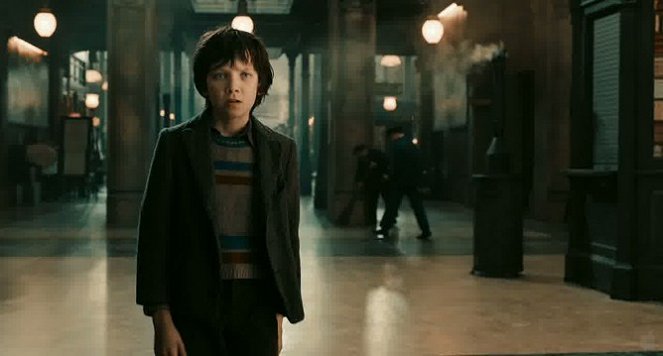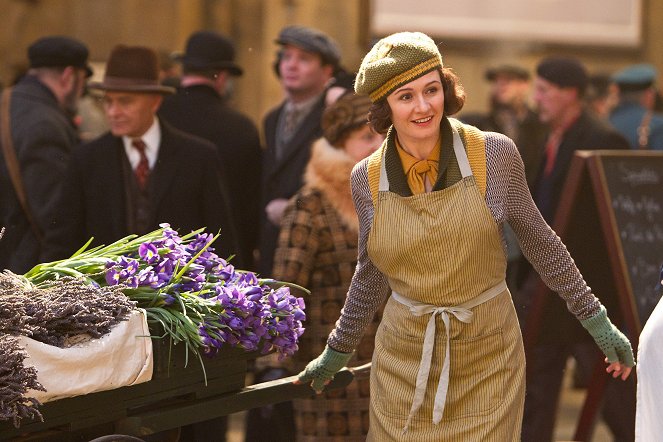Directed by:
Martin ScorseseScreenplay:
John LoganCinematography:
Robert RichardsonComposer:
Howard ShoreCast:
Asa Butterfield, Chloë Grace Moretz, Ben Kingsley, Sacha Baron Cohen, Helen McCrory, Jude Law, Gulliver McGrath, Christopher Lee, Frances de la Tour (more)VOD (3)
Plots(1)
After his clockmaker father (Jude Law) perishes in a museum fire, Hugo goes to live with his Uncle Claude (Ray Winstone), a drunkard who maintains the clocks at a Paris train station. When Claude disappears, Hugo carries on his work and fends for himself by stealing food from area merchants. In his free time, he attempts to repair an automaton his father rescued from the museum, while trying to evade the station inspector (Sacha Baron Cohen), a World War I veteran with no sympathy for lawbreakers. When Georges (Ben Kingsley), a toymaker, catches Hugo stealing parts for his mechanical man, he recruits him as an assistant to repay his debt. If Georges is guarded, his open-hearted ward, Isabelle (Chloë Moretz), introduces Hugo to a kindly bookseller (Christopher Lee), who directs them to a motion-picture museum, where they meet film scholar René (Michael Stuhlbarg). In helping unlock the secret of the automaton, they learn about the roots of cinema, starting with the Lumière brothers, and give a forgotten movie pioneer his due, thus illustrating the importance of film preservation, a cause to which the director has dedicated his life. If Scorsese's adaptation of "The Invention of Hugo Cabret" isn't his most autobiographical work, it just may be his most personal. (Entertainment in Video)
(more)Videos (16)
Reviews (10)
2009 – Pandora. 2010 – the cyberspace of TRON Legacy 3D. 2011 – A Parisian train station. Three very different magical worlds and three reasons to pay a few crowns more of a 3D cinema ticket. In addition to the intoxicating visuals, Hugo captivates with its two child protagonists (such likeable kids is not something you see everyday in film – with Chloe is no surprise, but Asu was unknown to me) and its sincere love for cinema. As it’s clear from all the reviews, Hugo is a beautiful celebration of the beginnings of cinematography and it’s very easy to surrender to it. What’s worth noticing is that both Hugo and the silent and black and white The Artists are this year’s biggest Oscar favourites and they’ve received the most nominations. Both deal with a certain period that marked a turning point for cinema. Hugo focuses on the beginning of the century in France, and in particular the work of G. Mèliès, which was setting the trends at the time, and the turning point means WWI, due to which the epicentre of the film world moved to America. The Artist, in contrast, celebrates the American silent movies of the 20th century, and the turning point is sound. Both of them imprint the world into their format, where The Artist is a silent romantic comedy and Hugo is a fairytale that uses special effects to bring the viewer into its (3D) world (and that’s why you must watch it in 3D). Almost like Mèliès A Trip to the Moon, init? :). It’s interesting how it came together this year…
()
The original book has turned into an unoriginal film in which every added thing is just excessive. A lot of scenes seem to have been made just for the vaunted 3D (especially the completely unnecessary train accident), the story is strangely sloppy, too set-up, and Sacha Baron Cohen makes too big a fool of himself... Yes, the direction is skillful, the love for Hugo films is also very nice, but I certainly didn't see anything groundbreaking. Which is quite a shame. I don't tend to do that, but this time I really want to scream: Read the book, it's so much better!
()
Some dreams do come true. The magic of film intertwines with reality, sketches with meticulously crafted images fly through the air, and Martin Scorsese pays homage to the beginnings of cinematography without getting overly sentimental or desperately trying to become a classic. Hugo seems to be a sophisticated fairy tale about a boy and his great adventure, only to ultimately transform into a fascinating journey through human imagination and determination. And that nostalgic hurricane of memories of children's books and movies, as well as fascination with unreachable worlds, managed to fully captivate me with its strength.
()
Martin and his big movie. Not his best, but undeniably his most personal. Here Scorsese (Hugo is him) professes his lifelong love of stories in the form of a melancholic kids’ movie which isn’t so much for kids, after all. And in addition to this he was the first to prove that 3D has its rightful place in cinema, where it can be something more than a mere good-looking bolt-on. Mainly and primarily this is a darn good movie; and that is all that is important in the end.
()
Paradox: the simplest film illusion created in the most technically complex way. A return to the initial astonishment. For me, it’s not closest to The Artist and other parallels presented here, but rather Herzog's Cave of Forgotten Dreams. Even Scorsese tries to return to the magical moment of ecstasy from the world of visions, to the dimension in which the image on the retina changes into the complex world behind it. I spent two hours in the movie theatre in bliss and ecstasy from something that was not and is not. Hugo's value is not in its (factually dubious) encyclopedic teachings, but in the fact that the film teaches us to rejoice in the imagination - not in the stimulating visual expansion that evokes its utter stunting, but in the journey into the interior in which the most beautiful spells are always performed, stimulated by the magic of pen and celluloid masters. I hope that one day I will raise a kid that the anachronistic illusionist Hugo will entertain, even with its embarrassingly romantic (and soothing) vision of the world as a mechanism in which everything has a fixed place...
()



Ads